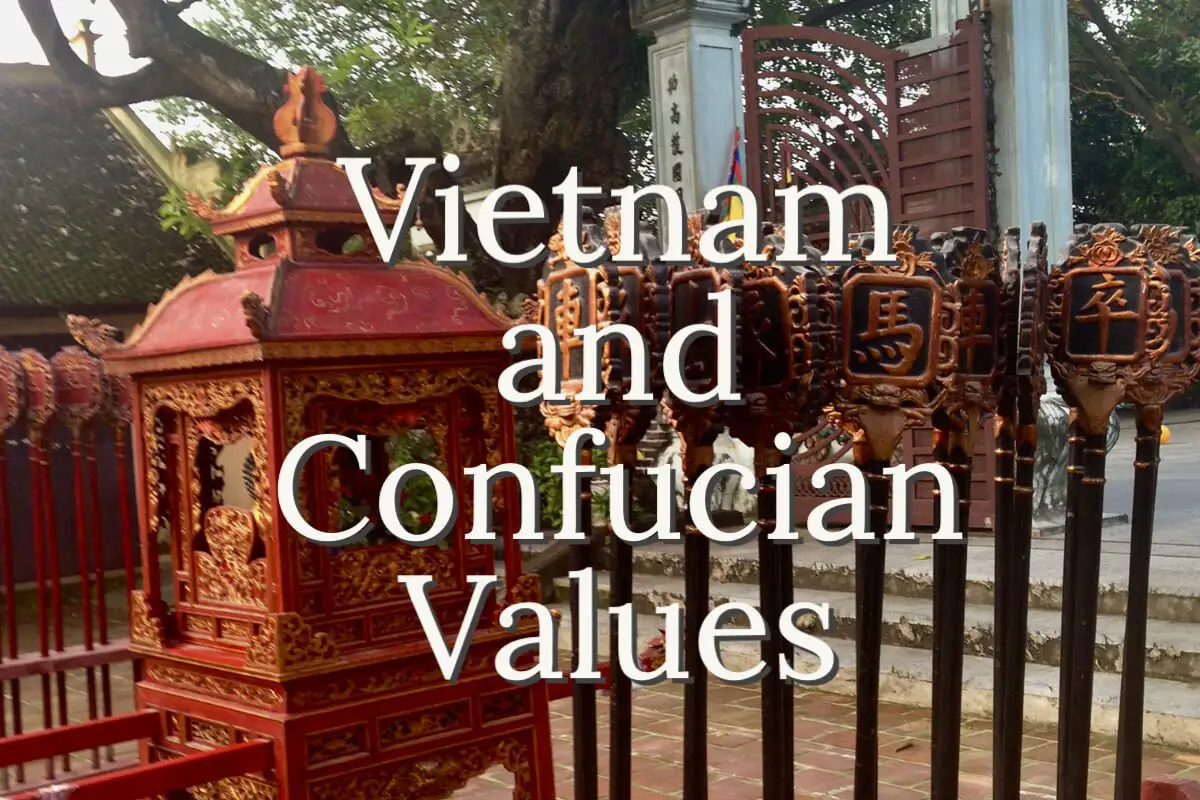Some people think that Confucian values are found only in China, but the truth is that Confucian values have influenced many other places, including Vietnam. You can find Confucian values in many aspects of Vietnamese daily life.
The Confucian values have influenced Vietnamese society and culture with piety to parents, the patriarchal society, worship, and respect for ancestors. There is also respect for those who are older than you. The Vietnamese education system teaches many Confucian values, ingrained in the entire education system and society. Confucian values are a part of everyday Vietnamese life and social relationships. To really understand Vietnam, you need to understand the influence of Confucian values on Vietnamese society.
Table of Contents
- Top Ways Confucian Values Influence Vietnamese Family Life and Society.
- Shifting Changes in Vietnamese Culture
- Related Questions
Top Ways Confucian Values Influence Vietnamese Family Life and Society.
Confucianism is an influential moral system that originated in China, but its values have impacted East and Southeast Asia countries. In Vietnam, Confucianism has shaped the country’s foundation of familial and societal principles since ancient times.
Through various codes of behaviors like filial piety and ancestor worship, Confucian ideals were a backbone for many Vietnamese families, who still use them to govern their lives today.
Below are some examples of Confucian values influencing Vietnamese family life and society. This shows how strong these values are even in Vietnamese society today.
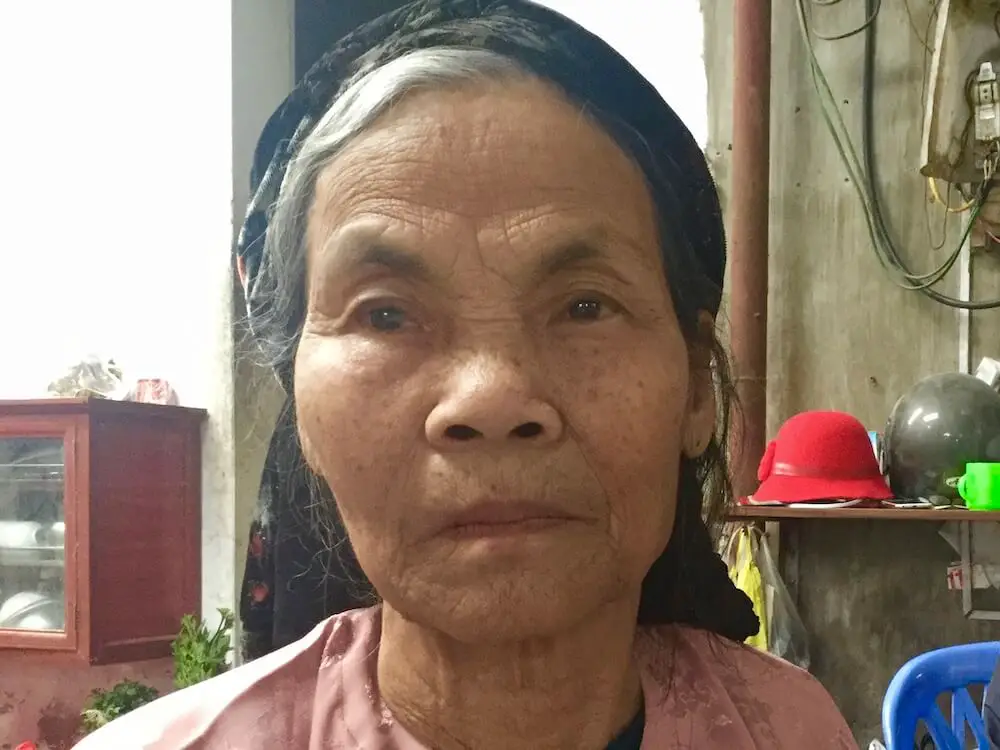
Vietnamese Filial Piety to Parents
In Vietnam, you can still see the influences of Confucian values in Vietnamese family relationships. Children are to show complete respect to their parents and those older than them.
This is why, even today in Vietnam, you will see grown adult children who will not marry someone because their parents disapprove. I have also seen people get married to someone not because they loved them but because their parents told them to marry that person.
Regarding marriage, the parents on both sides will be involved and make decisions for their children—what day to get married, where to get married, and all the other celebrations.
Parents will be involved in many aspects of their children’s lives, from telling them they must become doctors when they want to be artists. The children will not go against their parents or tell them they disagree. This is because they have been taught to have complete piety to their parents.
Sons and daughters cannot talk back or talk loudly to their parents. This is respect for the elders and the parents, even if the child is 30 or 60.
A good child should take care of their parents when they grow old; it is not considered filial or socially proper to put them in a nursing home or care for another person.
Vietnam’s Patriarchial Society and Women
Vietnam is a patriarchal society. Historically, the Vietnamese did not educate girls. I remember one Vietnamese woman who told me the story of her grandmother.
Every day, her grandmother would have to take her little brother to school; she would stand outside the classroom and listen to the teacher through the window. She stood there all day, every day, and then would go home and do the same homework as her little brother. This was how her grandmother became educated.
In many parts of Asia, women are to give birth and care for the household. Even today, you will find that many Asian women work all day and are expected to come home and take care of the house and children while their husbands sit around.
I have been to many restaurants in Vietnam where the restaurant or bar is filled with men smoking and drinking, and there are hardly any Vietnamese women. This is because Confucian society has two sets of rules – one for men and another for women.
Women should not smoke, drink, or improperly conduct themselves. And in extreme cases, a woman should have complete and total obedience to her husband.
Confucianism does not always look favorably upon women and the role of women. This is why you find in many countries that practice Confucius’s philosophy that women are not always on an equal footing with men in families, society, and even professional life.
This is why, even today, for some divorce cases, you might find that a Vietnamese man only cares about the son and does not want to have much to do with the daughter. It could be that his mother insists that she raise the son; in such a case, the natural mother has few rights.
This thinking goes back to how Confucianism views women, the rights of women, the patriarchal order, and the family structure. Confucius did not say much about women in the Analects of Confucius, but what he said was not very positive.
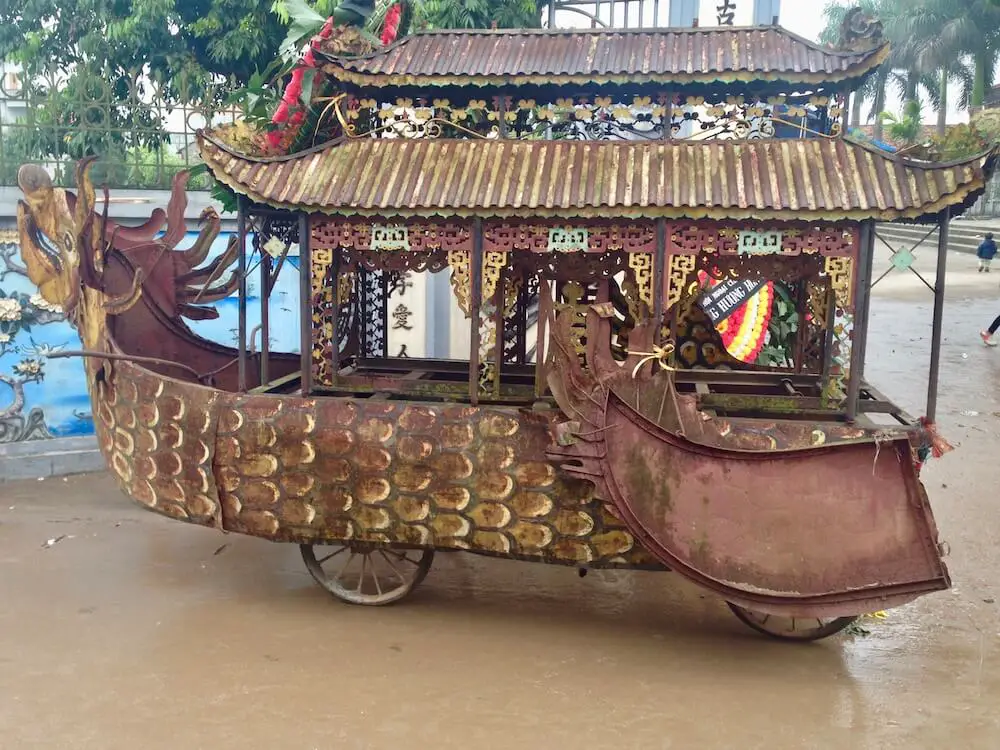
Vietnam and Ancestor Worship
Another area in which you can see the influence of Confucianism is in ancestor worship. Confucius taught that ancestor worship is the most crucial kind of filial piety you can have towards your family and ancestors. This goes much deeper in Vietnam than ancestor worships, as Vietnamese pride themselves in keeping their family genealogy.
Most Vietnamese will be able to tell you about their family and family history for several generations. You will find shrines in the home with ancestor worship. And you’ll find that many other families have a family book listing the generations of their family.
You will also find many family gravesites in the rice paddies while traveling out in the countryside in Vietnam. Most of these graves are neat and well taken care of, showing respect for their ancestors.
A traditional holiday in Asia is called Ching Ming (Qing Ming), where people sweep and take care of their ancestor’s graves. You can learn about this holiday by reading Where Is The Ching Ming (Qing Ming) Festival Celebrated? All About by clicking here.
Vietnamese Respect of Elders
In Confucianism, an older person is considered superior and should be respected by a younger person. A younger person should also be very polite and respectfully talk to an older person.
For some Vietnamese, the younger child will cross their arms in front of their chests and give a slight bow to show respect when speaking to someone older. Also, when a younger person receives something from an older person, they should always receive it with both hands because using one hand is considered impolite.
Vietnamese language and how people are addressed in Vietnam is built upon the respect of your elders. The language has a complete hierarchy of how you call someone in Vietnamese. Instead of using the words I, you, him, her, she, he, you will address the person, considering their age and if you are younger or older than them.
Here is a chart that illustrates the different titles or names used in the Vietnamese language.
| Vietnamese Name To Address | English Meaning |
| Cháu | Use to address a male or female younger child. |
| Em | Use to address a male or female who is younger than you but not a child. |
| Chị | Use to address an older woman, even a month older than you. |
| Anh | Use to address an older man, even if he is a month older than you. |
| Bà | Used to address an older female (someone much older, i.e., like a grandmother or great aunt) |
| Ông | Used to address an older male (someone much older i.e., like a grandfather or great uncle) |
This is why it is common for Vietnamese to introduce themselves and tell you their age or they may even come right out and ask you your age. This is because they want to know the polite way to address you.
This, of course, is very different from how we view age in the West. It can be very unnerving when people ask you how old you are or start addressing you by titles to show that you are older than them. In Vietnamese society, this is an essential part of being polite and showing respect for older people.
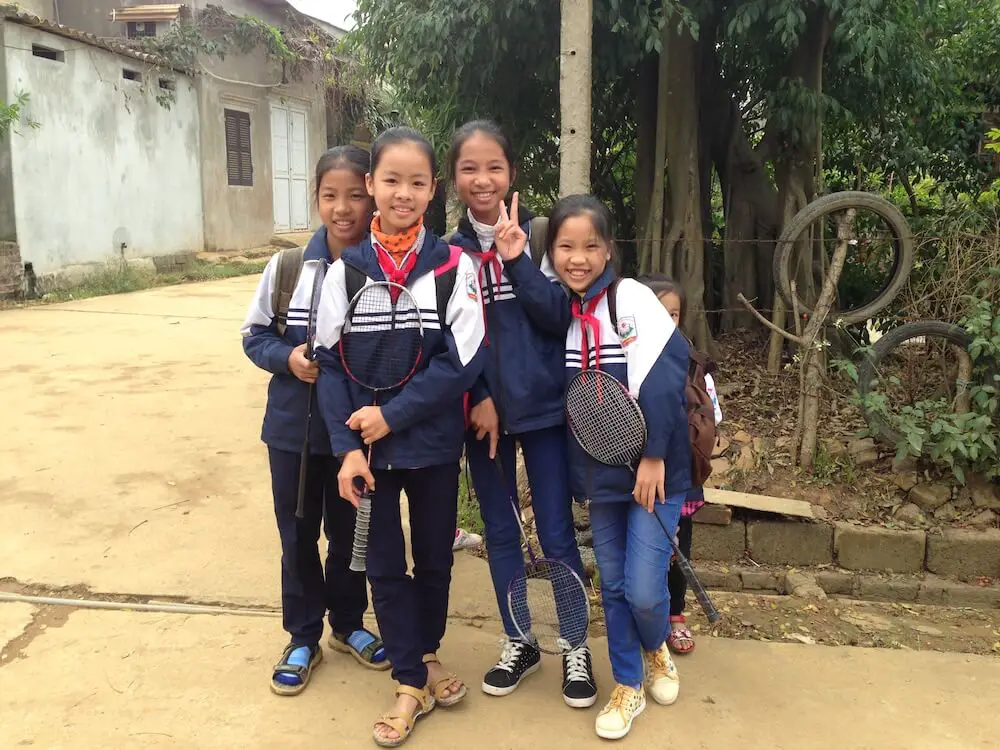
Vietnamese Education and Confucianism
Besides the family and social order, the other place where you see the influence of Confucianism is in the education system. In elementary schools, there’s an entire subject called ethics and morality, which is based on the Confucian teachings of the proper way to act and interact with others.
In Confucian teachings, teachers are always considered superior because they are responsible for teaching the students; Vietnamese students should completely respect their teachers.
When a teacher walks into a classroom, the entire class will stand up to greet the teacher. Teacher’s Day is an important holiday in Vietnam.
Education is important in Vietnamese society. Parents want to see their children receive excellent grades. If a child does not receive good grades, the child is usually ashamed,
This is why many Vietnamese children have very little free time. The parents expect them to go to school, get excellent marks, and take extra classes, such as English, on the weekend. Things like sports, music, arts, or dance are not considered an essential part of a child’s development.
Having beautiful handwriting is also a Confucian value. Confucius emphasized that neat handwriting reflected a person’s personality. Many Vietnamese schools have handwriting contests, and a child with elegant cursive writing is praised.
Vietnamese Education uses a Confucius model, which says in Vietnamese, “tiên học lễ, hậu học văn” Translated into English, this roughly means that you must first learn politeness, and then you can learn to read. This shows how influential Confucius was in the Vietnamese education system.
Confucius and Confucian values and thoughts have had a great impact on Vietnamese life and society. Confucius has influenced every aspect of Vietnamese life, from family, culture, and religion to education.
Shifting Changes in Vietnamese Culture
While living in Vietnam, I’ve observed a shift in traditional Confucian values, influenced significantly by Western culture. This change is particularly evident in the younger generation, where there’s a noticeable decline in the deep-rooted respect for elders that was once a hallmark of Vietnamese society.
This evolution highlights that Westernization may not always positively impact all countries and cultures.
Listen To Our Podcast About
Connecting Threads: The Resilience of Confucian Values in Vietnam
Below or By clicking here.
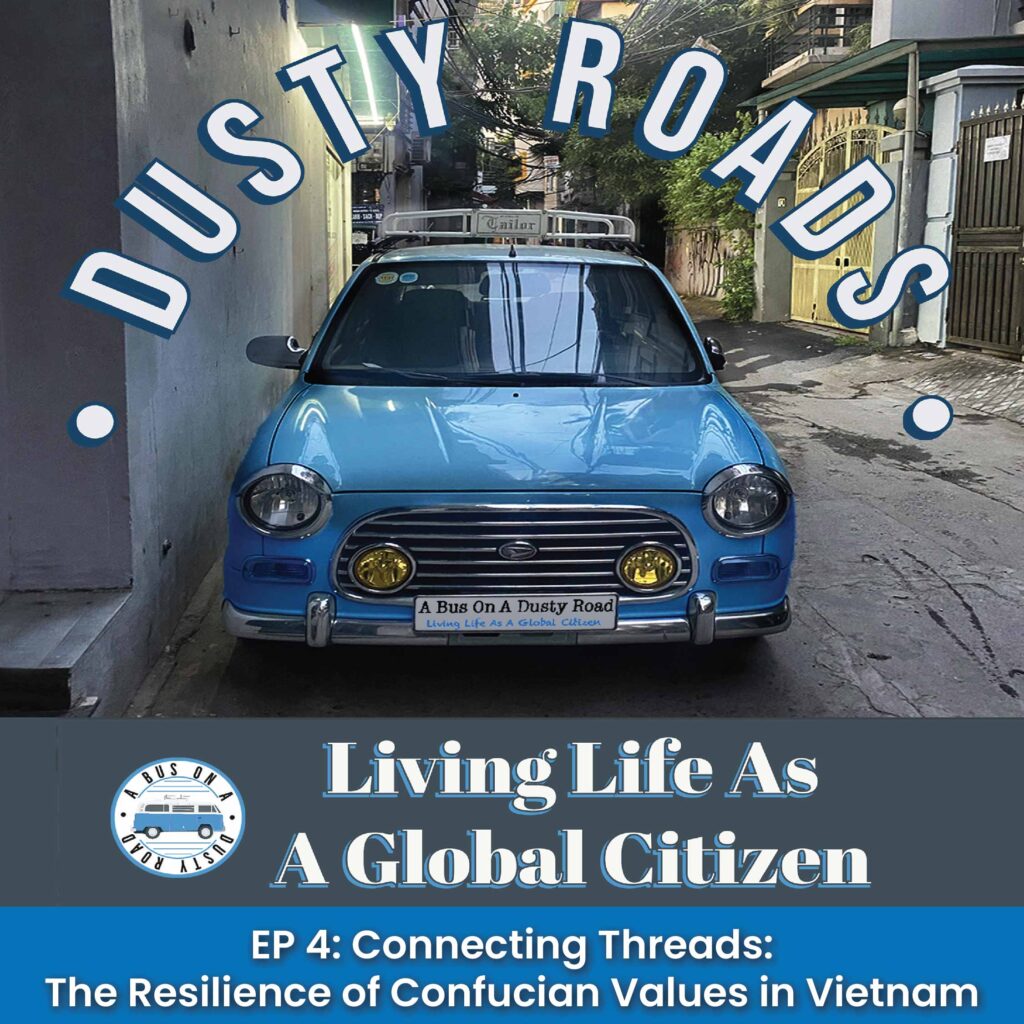
At A Bus On A Dusty Road, we discuss travel, life, and ex-pat living. We are all about “Living Life As A Global Citizen.” We explore social, cultural, and economic issues and travel.
We would love to have you be part of our community. Sign up for our newsletter to keep up-to-date by clicking here. If you have any questions, you can contact me, Anita, by clicking here.
Listen to our Podcast called Dusty Roads. You can find it on all major podcast platforms. Try out listening to one of our podcasts by clicking here.
Subscribe to our A Bus On A Dusty Road YouTube Channel with great videos and information by clicking here.
Related Questions
What Is The Vietnamese Propaganda Art?
Propaganda posters first started in the Soviet Union and then spread to other socialist countries like Vietnam. Posts have been an essential part of the Vietnamese art scene for many years. You can still see the propaganda art posters around Vietnam.
You can discover more by reading our blog Vietnamese Propaganda Art, All You Need To Know by clicking here.
What Is Marxism?
Marxism is the political, social, and economic theory named after Karl Marx. A significant contributor to Marxism was Friedrich Engels. Marx and Engel’s economic theory examines capitalism’s effect on labor, productivity, society, and overall economic development. They believe the relationship between the capitalist or business owners and the workers or laborers is exploitative, and the workers are always at a disadvantage.
You can learn more by reading What is Marxism? The Marxist Thought Explained In Simple Terms by clicking here.

